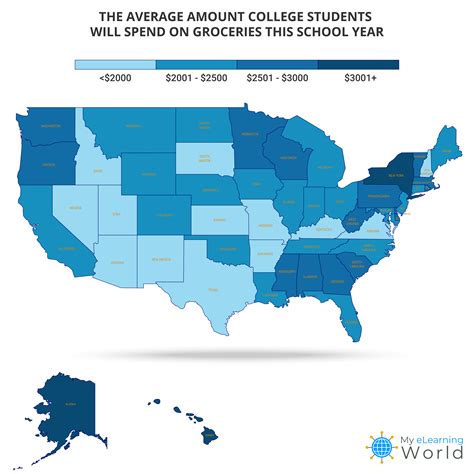As a college student, managing your finances is crucial, and one essential expense to consider is your grocery budget. Determining the appropriate amount to spend on groceries can be challenging, especially with the various factors that affect your individual needs and circumstances. This article will provide a comprehensive guide to help you establish a realistic grocery budget that aligns with your financial goals.

Understanding Your Needs
Before setting a budget, it’s important to assess your dietary habits, cooking skills, and lifestyle:
-
Dietary Habits: Consider any specific dietary restrictions, allergies, or preferences that may influence your grocery choices.
-
Cooking Skills: If you’re a proficient cook who enjoys preparing meals from scratch, you may be able to save money by purchasing raw ingredients and cooking in bulk.
-
Lifestyle: Your schedule, social life, and proximity to grocery stores will impact how often you shop and the types of food you need.
Factors Affecting Grocery Spending
Several factors influence how much you spend on groceries:
-
Location: The cost of living in your college town or city significantly affects grocery prices.
-
Store Selection: Different grocery stores have varying price ranges, so compare multiple options to find the best deals.
-
Brand Preferences: Name-brand products are typically more expensive than generic or store-brand options.
-
Sale Cycles: Pay attention to store sales and coupons to save money on groceries.
Recommended Budget Guidelines
While there’s no one-size-fits-all budget, here are some guidelines to consider:
-
USDA Thrifty Food Plan: This plan provides a weekly grocery budget based on dietary guidelines for a nutritious diet.
-
College Board: The College Board estimates that students should budget between $150-$200 per month for groceries, excluding toiletries and household items.
-
Experiential Data: Ask fellow students, family members, or friends who have similar dietary habits and lifestyles for their grocery spending experiences.
Setting a Realistic Budget
Use the following steps to establish a realistic grocery budget:
-
Track Your Expenses: Keep a record of your grocery purchases for a few weeks to identify your average spending and identify areas where you can save.
-
Identify Savings Opportunities: Explore ways to reduce your grocery costs, such as shopping at discount stores, buying in bulk, and using coupons.
-
Adjust Based on Need: Your grocery budget may fluctuate depending on your schedule, dietary needs, and other expenses. Be flexible and adjust your budget accordingly.
-
Create a Meal Plan: Plan your meals in advance to avoid impulse purchases and stick to your budget.
Strategies for Saving on Groceries
-
Meal Preparation: Cook more meals at home instead of eating out.
-
Bulk Buying: Purchase non-perishables in bulk when possible to save money per unit.
-
Generic Brands: Opt for generic or store-brand products when available.
-
Coupons and Sales: Utilize coupons, promo codes, and store discounts to lower your grocery bill.
-
Loyalty Programs: Join loyalty programs at grocery stores to earn rewards and discounts.
Tips and Tricks for College Students
-
Shop During Off-Peak Hours: Visit grocery stores during quieter times to avoid crowds and take advantage of potential discounts.
-
Consider a Grocery Delivery Service: Using a grocery delivery service can save you time and effort, especially during busy school periods.
-
Share Expenses with Roommates: Cook meals and share groceries with roommates to reduce individual costs.
-
Utilize Campus Dining Options: Explore meal plans and on-campus dining options that may supplement your grocery budget.
-
Take Advantage of Student Discounts: Many grocery stores offer discounts to college students with a valid student ID.
Conclusion
Determining how much to spend on groceries in college is a balancing act that requires consideration of your individual needs, lifestyle, and financial constraints. By understanding the factors that influence grocery spending, setting a realistic budget, and implementing cost-saving strategies, you can optimize your grocery expenses and make the most of your college budget. Remember to be flexible with your budget and adjust it as needed to meet your changing dietary and financial needs.
